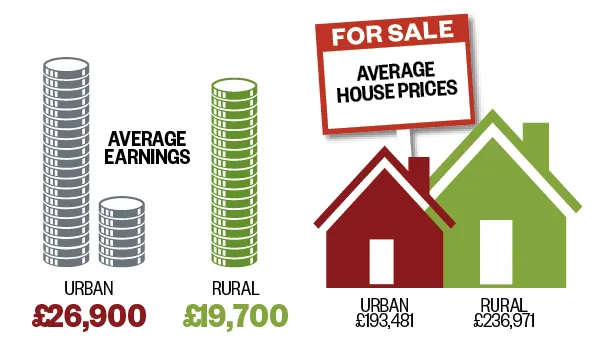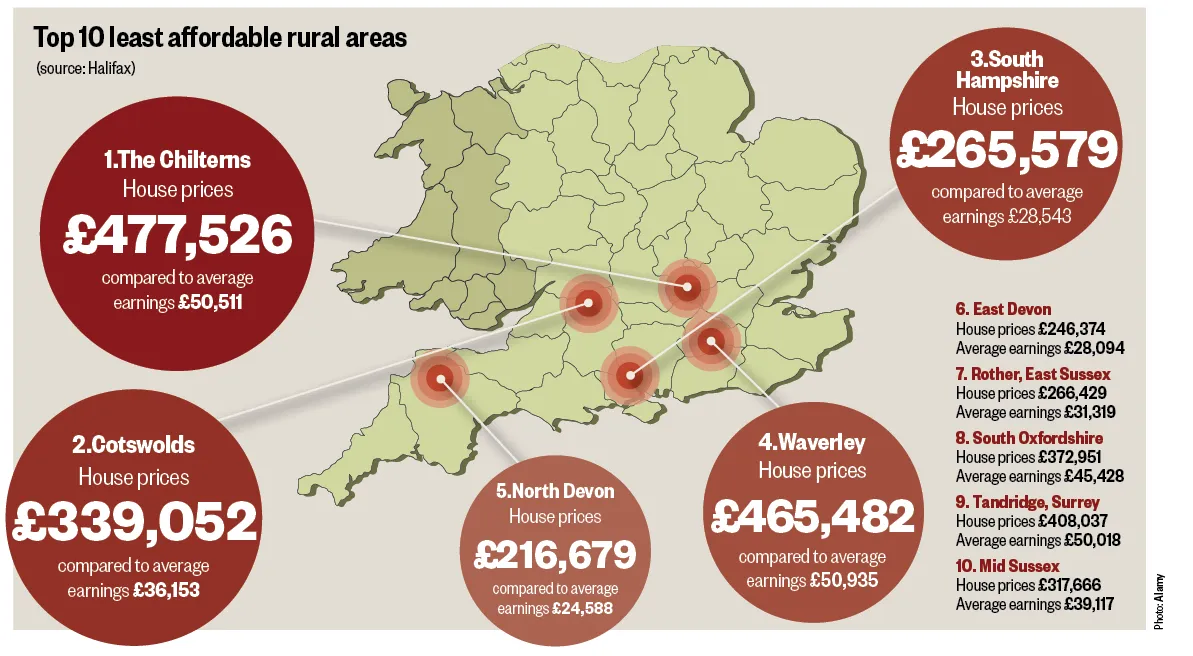Due to demand from retirees, commuters and second-home owners, rural house prices are typically 22% higher than those in urban areas, according to a Halifax survey at the end of 2015. Average rural earnings, however, are significantly lower than average urban earnings.
High prices, low wages

The key issues are higher rural house prices and lower rural wages. The popularity of rural areas, migration from urban centres and second home-ownership have contributed to rising house prices in rural areas. Local people often cannot compete, as earnings average £19,700 in rural areas compared to £26,900 for major urban areas, according to the Rural Housing Policy Review Group’s report in 2015, A Fair Deal for Rural Communities. “House purchase and rental costs are frequently beyond groups such as young adults, families and those on ordinary wages, displacing those with a local connection,” says Graham Biggs of the Rural Services Network.

Why are rural prices so high?
No incentives to sell land
The Fair Deal For Rural Communities report found there were “few incentives for landowners to release land
for affordable housing rather than hold on and hope for higher values from 100% market housing”.
No legal obligation
A legal obligation for affordable housing to be part of the mix on small-scale developments was removed in 2014. This was later reinstated by the High Court but this decision has in turn been challenged.
Poor planning
The National Farmers Union has criticised the planning legislation for making no references to the needs of farmer and grower families and businesses for affordable housing or to enable them to convert redundant agricultural buildings into homes.
Nimbysm?
“One of the big problems is that we, as a society, think it’s an honourable pursuit to fight new homes being built,” says Sue Chalkey, chief executive of Hastoe, a specialist rural housing association. The Rural Services Network (RSN) says the issue is more nuanced. Large-scale developments may be opposed, but “there is typically community support for smaller scale developments offering affordable homes that will address local needs,” says RSN’s Graham Biggs.
What are the solutions?
Think local “Working with local communities so they understand the benefits of affordable housing is critical,” says Fiona Howie, chief executive of the Campaign for National Parks.
Good design “High standards of design are critical,” says Howie. Sue Chalkley of Hastoe says “mediocre buildings” are “guaranteed to be opposed.”
Self-build Devon and Exmoor national parks have invited local people to express interest in self-build (right) with a view to it helping to meet local need for housing.
Affordable Homes Programme The Homes and Communities Agency says the programme will increase capacity to deliver affordable rural housing and release surplus public-sector land to create affordable rural homes. However, the programme has so far been targeted at making rents affordable, with a minority of funds used for affordable home ownership. The Rural Services Network says a rural target should be reinstated to the programme to give it sufficient focus.
Principal residence The Fair Deal for Rural Communities report said the Government should require a proportion of new-build homes on the open market to be granted planning permission on condition that they can only be used as principal residences. This approach has been adopted by Exmoor National Park Authority.
Local rents The report also said that to ensure rents are affordable in
“low wage, high house price” rural communities, rents should be charged at a level agreed locally rather than at a default 80% of market rates.
Affordable in perpetuity Other suggestions include clauses in mortgages for rural homes to ensure the property remains ‘affordable’ in perpetuity, whether or not the householder sells or even defaults on their mortgage.
What is the government doing?
The Government says its Housing and Planning Bill – currently at committee stage in the Houses of Parliament – will address issues of rural affordability and introduce new duties requiring local housing authorities to promote the supply of starter homes and support self-built and custom-houses. Specifically, starter homes would be new homes for first-time buyers aged under 40 that are sold with a discount of at least 20%, with prices capped at £250,000.
However the CPRE says there are no safeguards to prevent affordable homes subsequently being sold on the open market as holiday lets or second homes.
Sue Chalkley of Hastoe believes central government misunderstands how local rural landlords think. “You often just have one landowner with a lot of land and it has been in their family for generations. They understand that young people are struggling to afford to live there and are prepared to sell at lower cost but the bill provides no guarantees that the land will be sold at lower cost in perpetuity.”
Graham Biggs, chief executive of the Rural Services Network said the bill’s proposals to provide starter homes at 80% of market value could help, but were “highly likely to remain too expensive for most young people in rural areas, potentially defeating the stated purpose of the plan.”
Image: Gold Hill Shaftesbury. Credit: Getty
